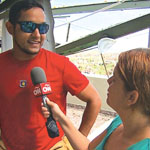‘KEEP THE FOCUS ON PUERTO RICO,’ BY MARIA SANTANA ’98, CNN EN ESPANOL ANCHOR/CORRESPONDENT

When I arrived on the island of Puerto Rico on September 25, five days after category 4 Hurricane Maria tore over the land, I hoped to report on the efforts to help the victims and to start rebuilding communities. But the situation was like nothing I’d ever seen in the United States.
The people would ask me, “Where’s FEMA? Where is the National Guard?” But instead of government Jeeps and FEMA workers, we saw a group of citizens trying to clear the roads. We saw a restaurant owner climbing a tree. His zinc roof had blown off and wrapped itself around the trunk. He and his neighbors were wrestling it down, hoping to reclaim it, rebuild, and open for business again.
I’d never seen the disaster victims themselves doing the cleanup. It was hard for me to reconcile the fact that these were U.S. citizens, that we were in a U.S. territory.
While we stayed at a hotel in San Juan—with internet accessibility to transmit our reports—even short trips into the countryside showed massive devastation. These were long days. We’d start out around 6 a.m. sometimes driving for two hours. We’d tape stories and head back so I could get a story in by 4 or 5 p.m. Then, I’d do live shots for the evening news shows, sometimes until 10 o’clock. After that, I’d spend a couple hours on social media, trying to contact families of people I’d met during the day to assure them that their relatives were still alive.
The lack of communication was the hardest. When I’d ask how they were doing, people would say, “I’m okay; I don’t have water yet” or “I don’t have any food”—but when I’d ask if they’d been able to reach their family, that’s when they’d start to cry. I’d hand over my CNN satellite phone to let them make their calls—but nobody memorizes numbers now, so if your cell phone has no power, you don’t know how to reach your family. The tip I’m passing on: Write down these numbers and keep them with you.
As the days went on, I kept waiting to see improvement, but the gas lines were still three miles long. People were waiting six hours to get ice. There were lines for the bank, lines for the supermarket, but when they’d get inside, nothing was left on the shelves.
Still I kept searching for a “good news” story, and finally I thought I’d found it: FEMA trucks parked in a town when we arrived one morning. But the mayor told us that for about 40,000 people, the trucks held food and water for maybe 12,000. “We’ll have to ration it very strictly,” he told us, explaining that he’d set up points of distribution.
We decided to travel along, caravan-style: first the trucks, then the mayor and the police escorts, with our car at the end.
And this is where the happy story ended.
We were traveling right through areas not on the distribution list. When people heard us go by, they came out of their homes, begging the caravan to stop—”Please, we need water! Can you give us some of that water?”—and all I could do was watch from inside our car.
When we arrived at our destination, there was already a line—grandparents, small children, everybody out in the heat with no shade anywhere, because the trees had lost all their leaves in the storm. The mayor tried to encourage people, telling them this was just the beginning of the relief efforts: six bottles of water, a can of tuna, and a protein bar per household. That was all.
An elderly woman told me that her husband had just had heart surgery and she’d left him alone to wait for this food. And then, only this small ration. She’d give him all her portion, she said.
“I don’t understand why are we not getting the help we need,” she told me.
I’m back in New York now—but my mission is to keep the focus on Puerto Rico. We can’t forget the people going through this large-scale humanitarian crisis. We can’t let this drop off the news cycle. And please know—when you hear Puerto Ricans say, “I’m okay, I’m good,” don’t believe them. I’d hear people say this, trying to reassure their families—But no! I’d seen that their houses were destroyed, that they’d had no water or food.
So, no. No one is fine. It will take months, if not years, to restore Puerto Rico to its pre-hurricane state. In the meantime, people continue to struggle, with preventable deaths from infection and disease among the many who still lack clean water and electricity for refrigeration, communication, and lifesaving medical equipment.

